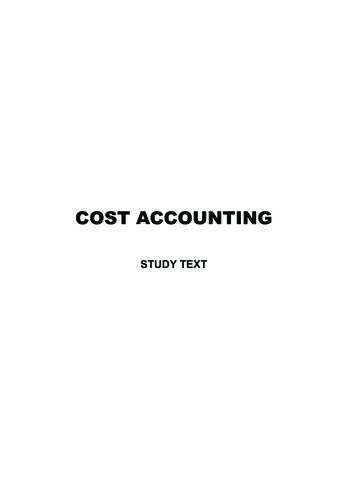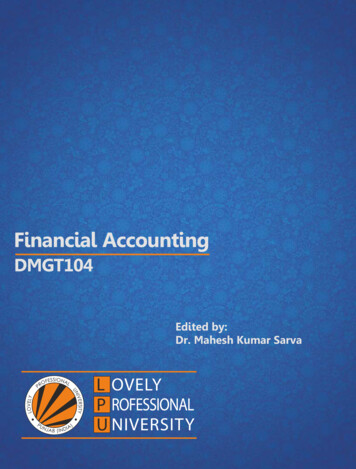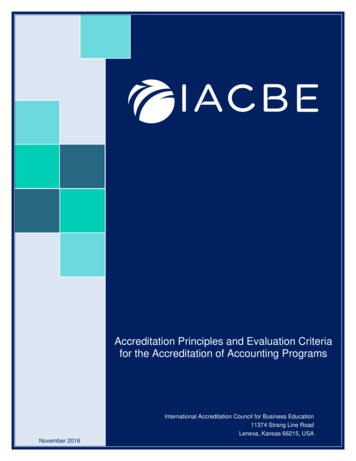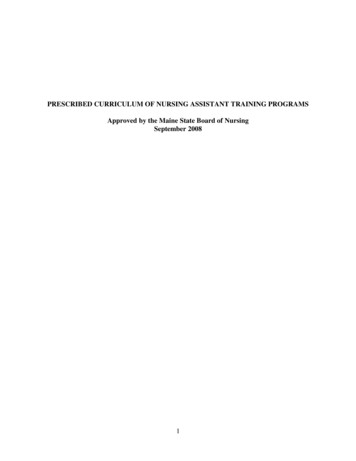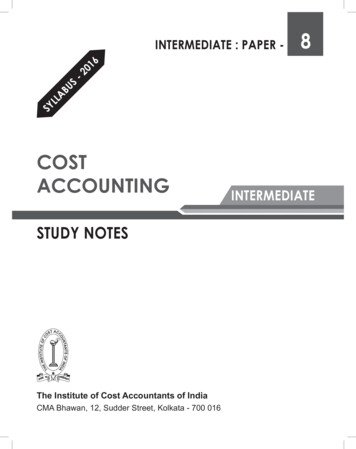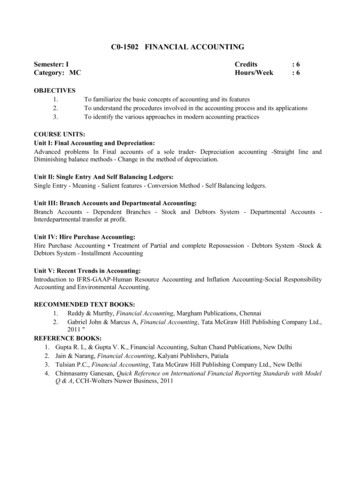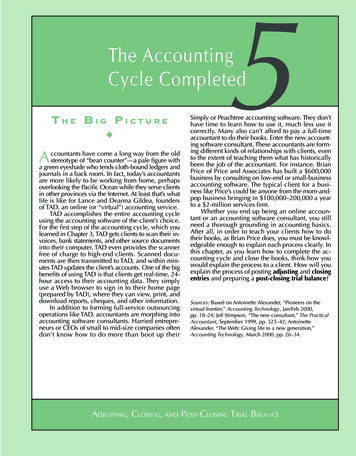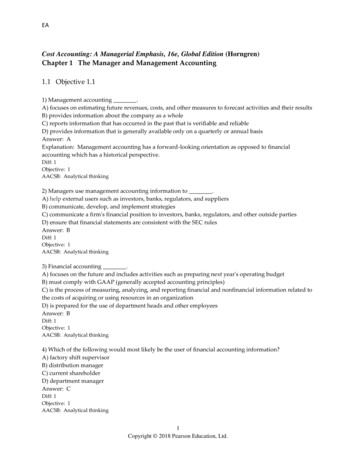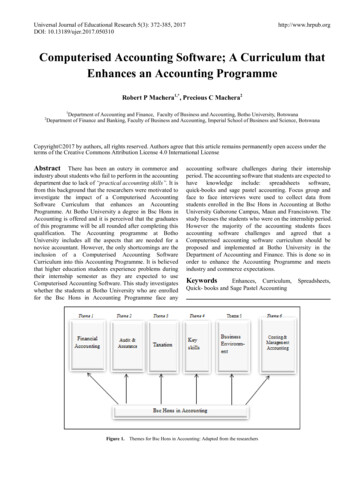
Transcription
Universal Journal of Educational Research 5(3): 372-385, 2017DOI: terised Accounting Software; A Curriculum thatEnhances an Accounting ProgrammeRobert P Machera1,*, Precious C Machera21Department of Accounting and Finance, Faculty of Business and Accounting, Botho University, BotswanaDepartment of Finance and Banking, Faculty of Business and Accounting, Imperial School of Business and Science, Botswana2Copyright 2017 by authors, all rights reserved. Authors agree that this article remains permanently open access under theterms of the Creative Commons Attribution License 4.0 International LicenseAbstract There has been an outcry in commerce andindustry about students who fail to perform in the accountingdepartment due to lack of “practical accounting skills”. It isfrom this background that the researchers were motivated toinvestigate the impact of a Computerised AccountingSoftware Curriculum that enhances an AccountingProgramme. At Botho University a degree in Bsc Hons inAccounting is offered and it is perceived that the graduatesof this programme will be all rounded after completing thisqualification. The Accounting programme at BothoUniversity includes all the aspects that are needed for anovice accountant. However, the only shortcomings are theinclusion of a Computerised Accounting SoftwareCurriculum into this Accounting Programme. It is believedthat higher education students experience problems duringtheir internship semester as they are expected to useComputerised Accounting Software. This study investigateswhether the students at Botho University who are enrolledfor the Bsc Hons in Accounting Programme face anyaccounting software challenges during their internshipperiod. The accounting software that students are expected tohave knowledge include: spreadsheets software,quick-books and sage pastel accounting. Focus group andface to face interviews were used to collect data fromstudents enrolled in the Bsc Hons in Accounting at BothoUniversity Gaborone Campus, Maun and Francistown. Thestudy focuses the students who were on the internship period.However the majority of the accounting students facesaccounting software challenges and agreed that aComputerised accounting software curriculum should beproposed and implemented at Botho University in theDepartment of Accounting and Finance. This is done so inorder to enhance the Accounting Programme and meetsindustry and commerce expectations.KeywordsEnhances, Curriculum,Quick- books and Sage Pastel AccountingFigure 1. Themes for Bsc Hons in Accounting: Adapted from the researchersSpreadsheets,
Universal Journal of Educational Research 5(3): 372-385, 20171. Introduction1)The Faculty of Business and Accounting at BothoUniversity offers a Bsc Hons in Accounting Programme thatis very competitive in the region. The first cohort of studentswas enrolled in the Accounting programme at BothoUniversity in July 2013. Currently the AccountingProgramme is being offered in Botswana and Lesotho. ThisAccounting programme consists of six themes that include:financial accounting, cost and management accounting,taxation, audit and assurance, business environment andpractical key skills. The Figure 1 represents a summarizedthematic diagram for the Bsc Hons in AccountingProgramme at Botho University.The six themes form the basis of accounting pillars thatmould the learners into competitive novice accountants.According to [8] a curriculum should strive to effectivelydeal with the modern world as this enhances the learners’competitiveness in the employment market. The Accountingprogramme at Botho links well with [8] philosophy, whichincludes four instincts such as: social, constructive,expressive and artistic. The themes in Figure 1 are thethemes expected of any accounting programme, but thequestion is does it fit into the modern world? Anyexperienced accountant would agree with the aboveaccounting themes and what is important is thecompetiveness of the programme. This paper focuses moreon (key skills) theme 4 as this brings about the issues onoutcome - based learning. Theme 4 is the backbone of theaccounting programme as it reflects the skills that are neededby accountant in order to fit in an accounting environment.Modern employers require accounting graduates who arehands - on and self – starters as they have limited time andresources to invest into training and development [4]. In thecontext of Bsc Hons in Accounting, it appears thataccounting students acquire key skills (theme 4) but thelimitation in this theme 4 is learning on how to use theaccounting software (packages). This research focuses on thefollowing packages: spreadsheets, quick- books and Sagepastel accounting. The inclusion use of accounting software(packages) as a module is a serious gap in most AccountingProgrammes hence it was imperative to investigate the needfor computerized accounting curriculum. It was from thisbackground that motivated the researchers to conduct thisstudy.[10] study report that accounting firms perceive thatstudents with internship experiences and background aregiven much preference in the employment job market.Furthermore, [10] is of the opinion that there may be relatedchanges in student’s beliefs after participating in aninternship program and this is a similar perception whichwas adopted in this study. According to [10] the followingare traits that the student is expected to possess after theinternship program:2)3)4)373Personality traits such as being personable orhaving a positive attitudeTechnical / business traits such as analytical oraccounting skillsInterpersonal skill traits such as communicationskills and leadershipBackground / other traits such as Grade PointAverage (GPA), work experience and computerskillsThis research targeted background / other traits such asGPA, work experience and computer skills since they are achallenge to be achieved by many undergraduate students.For example experience and knowledge of Computerisedaccounting may be difficult to be attained by undergraduatestudents since they would be at college. This study perceivesthese traits as paramount to accounting graduates.Computerised Accounting Packages have many benefits asshown in Table 1.Table 1. Benefits for Computerised Accounting (Adapted from theresearchers, 2016)Benefits for Computerised Accounting:Easy to reconcile stock on handEasy maintenance of asset registersGives a provision for graphs and financial ratiosProvides the business with financial intelligenceCloud accounting - online accounting (connectivity onsmart phones, i-phones and use of internet Enhances speed for entry processing (e.g. add on modulefor bank manager) Enhances the rate for employability traits and selfreliance (consultancy) Enhances completeness and accurateness 1.1. Commonly Used Accounting Software1.1.1. Quick BooksQuick Books is accounting software (package) that is usedto process accounting transactions [21]. This softwareprovides the user with the following features: chart ofaccounts, customised invoices, track accounts payable, trackaccounts receivable, profit and loss statement, balance sheetand manage cash flows. This software may be used by smallbusinesses and medium sized entrepreneurs. TheQuickBooks software provides the Quick Payroll Software,which is used in processing employee salaries. For moredetails about the technical features see [21]. However, theresearchers are not licensed with QuickBooks in order toprovide the some samples of the package.1.1.2. Sage Pastel AccountingSage Pastel Accounting is accounting software (package)that is used to process accounting transactions [19]. Thissoftware has a payroll add on module which is used toprocess salaries. Sage Pastel Accounting software providesthe user with the following features [19]:
374Computerised Accounting Software; A Curriculum that Enhances an Accounting ProgrammeChart of accounts: this is a list of all the accounting codes as for example:Process:The process feature includes: the journals, cash book, bank reconciliation, customers, overdue customers interest, suppliers,inventory journals, manufacture, count inventory, match open item, time and billing and receipts.
Universal Journal of Educational Research 5(3): 372-385, 2017Trial Balance: The trial balance shows comparative figures from last year.Income StatementBalance Sheet375
376Computerised Accounting Software; A Curriculum that Enhances an Accounting ProgrammeCash Movement: This is for cash flow purposesGraphs: The feature provides with all the graphs that may be needed by the accountant.With a click of this icon a graph will be produced from the applications.
Universal Journal of Educational Research 5(3): 372-385, 2017377Business Intelligence Center Dashboard: This shows top and bottom items in the business.1.1.3. Spreadsheets as Complimentary to Sage PastelAccountingSage Pastel Accounting is the application that was rankedhighest with participants in [4] study. Spreadsheets arewidely used throughout the whole world, either withaccountants, engineers and many other professions. In thispaper it is seen that most of the reports from Sage readsheets reports. When using Sage Pastel Accountingusers may import and export figures using spreadsheets. Seefeatures above such as graphs, financial ratios and thedashboard which has been imported or exported from SagePastel Accounting software.1.2. Statement of the ProblemThere has been an outcry in commerce and industry thatthe graduates for accounting are failing to perform and thiscost them a lot of money and time through induction andtraining. Most of the reasons gathered from commerce andindustry are that the accounting students lack the skills andknowledge that are expected of them especially the use ofaccounting package. It is therefore perceived that theaccounting students understand the theory aspects but lackon the following practical areas: problem solving, analyticalthinking and application and use of accounting packages(software). It is from this background that motivated theresearchers into investigating whether the implementation ofaccounting software curriculum enhances students’ practicaltechnical skills, problem - solving skills and analyticalthinking skills that are expected of by commerce andindustry.1.3. Aim of the StudyTo investigate the perceptions of the students towards theimplementation of Computerised accounting curriculum inorder to enhance the accounting programme.1.4. Objectives of the StudyThe objectives of this study are as follows: To ascertain students’ perceptions towards theimplementation of Computerised Accountingcurriculum. To identify the benefits that accrues from theimplementation of Computerised Accountingcurriculum. To recommend an inclusive curriculum that takescognisance of problem - solving, analyticalthinking and application and use of accountingpackages (software).1.5. Research QuestionsThe following are the research questions for this study: What are students’ perceptions towards theimplementation of Computerised Accountingcurriculum? What are the benefits that accrue from theimplementation of Computerised Accountingcurriculum? What are the recommendations for an inclusivecurriculum that takes cognisance of problem solving, analytical thinking and application anduse of accounting packages (software)?1.6. Contribution to the Knowledge DomainThe significance of this study is that, it would benefitmany stakeholders that include: educators in the accountingfield, accounting students, universities, colleges and captains
378Computerised Accounting Software; A Curriculum that Enhances an Accounting Programmeof industry. The implementation of an inclusive curriculumthat takes cognisance of practical skills will reduce costs oftraining for prospective employers. Furthermore, thegraduates of accounting programme will be hands - on hencemay be able to: set - up their own consulting firms andreduce the level of unemployment. If this study is publishedit would add value to the body of knowledge as it improvesand enhances the practical skills for accounting students.2. Literature Review2.1. The Importance of CapstoneAccording to [12] many universities and colleges offercapstone course in the form of: an individual course,internship, volunteer or out-reach experience, consultation,research project, academic professional partnership or acombination of several experiences. In the context of thisstudy, a capstone is viewed into two aspects as follows:individual course and internship experiences. The students atBotho University are placed on internship during semester 7after learning all the theory aspects expected of anaccounting student. Based on the study conducted by [3]they appear to be a skills gap in Botho University’sAccounting Programme, as students are not taughtComputerised Accounting Skills. A ComputerisedAccounting module involves teaching students practicalskills which are beyond the classroom. According to [18]modules that teach students practical skills are outcome based. Outcome - based modules enables the learners and theinstructors in getting constructive feedback on what thelearner can do after the completion of each out - come hencethis phenomenon enhances the learners to be hands-on(learning by doing, refer to Figure 2) . The philosophy thatpromotes hands- on learning increases the learners’ degreeof employability and chances for becoming a self - reliantindividual.2.1.1. Individual Course as a CapstoneThis section discusses a capstone as an individual courseor module in an Accounting Programme. [1] and [4]concluded that computer skills and accounting softwareapplications must be taught to accountants and additionalcourse materials should be taught in all accounting courses.The teaching of accounting software applications enhancesand enriches education. There are similarities between thisstudy and the study for [4] as follows: This study involvesaccounting degree students’ feedback during their internshipand the study for [4] involves accounting students whoparticipated, before and after the internship and the aim forboth studies were to determine the importance of practicalcomputer skills to accounting students. The results in [4]study reveals that accounting students, faculty and certifiedpublic accountant firm recruiters believe that computer skills,accounting software, databases, email / internet,programming, spreadsheets and word processing wereimportant skills to accounting students. There are manyaccounting applications and software but this study focuseson Quick Books, Sage Pastel Accounting and Spreadsheets.2.2. Out-come Based Education (Learning)Outcome - led curricula are increasingly relevant tomodern accounting education as employers preferaccounting graduates who have hands on competencies.According to [12] many universities and colleges offer acapstone course in business or accounting. Outcome - basedis a criterion or standard that is used to set against the successof the course and the learners’ competencies at the end of theprogramme [18]. In education reflective practice refers towhereby students reflect on what has been taught during theentire course or programme. Reflection in education is notnew as it was used in the studies conducted with manyphilosophers and educational scholars such as [8]; [5], [6];[7]; [20]; and [16]. [14] discusses the role of reflection in theexperiential learning cycle.A reflection may be in the capstone module wherestudents are required to reflect their past experiences in theentire programme [12]. According to [12] the structure of thecapstone can be as follows; individual course, internship,volunteer, out-reach experience, consultation, researchproject, academic- professional partnership, or acombination of several experiences. Many studies oncapstone courses were written by [13] and [9].The theoretical framework that informs this study is [14]experiential learning, see Figure 2 below.
Universal Journal of Educational Research 5(3): 372-385, 2017379Figure 2. Kolb Model of Experiential Learning Process: (Adapted from Baker, Robinson and Kolb, 2012)The study conducted by [3] concludes that experientiallearning builds meta- cognitive skills which may be a goaloriented and assessed. (Experiential learning model seeFigure 2) [14] of experiential learning assumes that thelecturers or teachers teach beyond the classroom in order toensure that the learners are able to apply the concepts that areneeded in the real- life situation.This concept ofexperiential learning may be used in many teachingapproaches such as: field work, internships, simulations,vocational training and games [11]. This study focuses onthe internship feedback of students who are studying a BscHons in Accounting. It was imperative to investigate thegaps between what is being taught in classes and the actualapplications of accounting concepts at the work place oninternship students in order to enhance accountingprogramme at Botho University. In other words this was anevaluation of theme 4 (key skills) offered to accountingstudents. The following section focuses on the problemstatement of this study.Maun).Table 2. Botho University: Bsc Hons in Accounting - internship scheduleInternship studentsFTWGBEMAUTotal262Total5219317Percentage %20%74%6%3. Research MethodologyA research design is a plan which explains how aresearch would be conducted [17]. In this study a qualitativeapproach was used to collect data from the participants. Thestudy used a focus group and face -to- face interviews asmethods for collecting data from the students on internshipregistered in the Bsc Hons in Accounting at BothoUniversity (semester 7, period July 2016 - December 2016.The following is a table that represents the internshippopulation for three campuses (Gaborone, Francistown andGraph 1. No. of students on internship per CampusThe focus group of 16 participants was selected from eachcampus based on the percentages shown in Table 2 above.The calculation for the sample is shown in Table 3 below.
380Computerised Accounting Software; A Curriculum that Enhances an Accounting ProgrammeTable 3. Program version Enrollment: Bsc Hons in AccountingCampusPercentage - %Total focusCalculationsFocus group per CampusFTW20%1620% x 163GBE74%1674% x 1612MAU6%166% x 161Total1616Graph 2. Focus group selected per campusA brainstorming was conducted in order to conduct the participants about the focus group workshop.The researchersmanaged to get the students’ consent to participate in this research.According to [15] and [2] it is important to protect individual’s autonomy hence researchers should not coerce anyparticipant to participate in any study. Furthermore in this study the researchers did not divulge any confidentialinformation to third parties without the participants’ consent as this would be an infringement of the participants’ rights toprivacy. Finally names were not used in this study as each participant during the face -to- face interviews were allocatedwith codes.4. Results/Findings of the Study4.1. Focus Group WorkshopThe following were the results from the focus group workshop:
Universal Journal of Educational Research 5(3): 372-385, 2017381Table 4. Responses from focus groupQuestions4.1.2. The focus group participantswere asked that views towards theimplementation of a ComputerisedAccounting Curriculum:4.1.3. The focus group was askedwhether there were any benefits thataccrue from an implementation of aComputerised Accounting Curriculum:Responses from focus groupAll the participants agreed that a Computerised Accounting Curriculum enhance accountingstudents’ rate for employability traits and self – reliance (consultancy). The participants furtheragreed that it was a challenge for most of them to be on internship without having attainedComputerised Accounting Skills. They perceived that most of the employers prefer students withknowledge and skills in Computerised Accounting. Therefore the focus group appreciated andwelcomes the idea to implement a Computerised Accounting Curriculum as part of the Bsc Hons inThe participants agreed that there are many benefits that accrue from the implementation of aComputerised Accounting Curriculum. The following are some of the benefit;The users of a Computerised Accounting System adopt data entry processing skills that enhance thespeed for operating a computer. The users may easily adapt to cloud accounting and this enhances thechances for getting consultancy work.The participants agreed that an inclusive curriculum enhances accounting learner’s problem solvingand analytical thinking through the use and comparison of different reports that may be extracted fromthe accounting software. The following were the examples which they provided during the focusgroup: If the physical inventory is not agreeing with the figure in the nominal ledger:It is easy to make reconciliation as we compare the physical stock with the theoretical stock fromComputerised system such as Sage Pastel Accounting. The two reports will show where there arediscrepancies and journals are then passed to make corrections. This is quick that a manual systemwhereby individuals should add the balances on each bin cards and then compare with the actualstock- taking, this may take some days otherwise the reconciliation may overlap to the followingmonth without being finished.4.1.4. The participants were askedwhether an inclusive curriculum takesinto account: problem - solving,analytical thinking: If the bank reconciliation is not balancing:The one who is reconciling may compare the print- outs for the receipts and payments with the bankstatements to establish the discrepancies. This does not take time as compared with the manual cashbook whereby the actual manual cash book is compared with the bank statements. If the debtors control is not agreeing with individual debtors ledgersThe credit controller may compare the debtors ledger balances with the nominal ledger and thepayments from the main cash book. This exercise does not take much time as compared to the manualreconciliation of debtors whereby each receipt (payment) from customer is to be manually added toget total payments, as well as the invoices from each customer are added to get the total amount ofsales per that particular month. This is time consuming as compared to the Computerised accountingsystem were balances are tested for validity before checking individual accounts. If the creditors control is not agreeing with individual creditors ledgersThe credit officer should be able to reconcile the creditors’ ledger against the nominal balances, anydiscrepancies may be detected through a comparison of receipts captured in the system (in thecreditors’ ledger) and the cash book payments. It takes time to reconcile the manual creditors’ ledgeraccounts with the nominal ledger as compared to when using a Computerised accounting system.If the wages and salaries control remain with a balance after processing all the transactions relatedto payroll for that particular month:It is easy to reconcile the wages and salaries control since it is possible to trace the remaining amountin this control account and establish its source then journals may be passed to correction the error ifits origin is not of fraudulent nature. It will take time to reconcile the wages and salaries using amanual system hence it is imperative to adopt a Computerised accounting package. 4.1.5. The following are computerisedaccounting and other software that theparticipants were comfortable to use:We are comfortable to use the following software as future accountants: Sage Pastel Accounting,Quick- Books, Excel spreadsheets, Word processing and Power - point.4.2. Face -to- Face InterviewThe researchers used a face- to- face interview as a follow -up to the focus group workshop, to see whether the individualperceptions were agreeing with the group’s perception towards the implementation of a computerised accountingCurriculum. The criteria used to select participants for face- to- face interview included 1 (one) internship student fromeach class (batch). This means that this convenient strategy included a representative in each class and campus, see Table 5.Table 5. Participants for face to face interview and coding system (adapted from researchers)Number of studentsParticipants’ codeGaboroneBatch 11GAB01Batch 21GAB02Batch 31GAB03Batch 41GAB04Batch 51GAB05Batch 61GAB06FrancistownBatch 11FTW01MaunBatch 11MAU01Total8
382Computerised Accounting Software; A Curriculum that Enhances an Accounting Programme4.2.1. Results for face- to- Face InterviewThe following were the results for the face-to faceinterview:Participant: GAB01What is your view towards the implementation of aComputerised Accounting Curriculum?I welcome the implementation of a ComputerisedAccounting Curriculum in our Bsc Hons inAccounting. This system will assist me and my peersin gaining computer skills that are needed withemployers. It was a challenge to work in theaccounting department without these skills.Which computerised accounting and other softwarethat you are comfortable to use?The most important software that I want to use duringmy entire life is Sage Pastel Accounting and ExcelSpreadsheets.Participant: GAB02What is your view towards the implementation of aComputerised Accounting Curriculum?The Computerised Accounting Curriculum is longover –due, we have been asking management everyabout its implementation. We have discovered thatmany employers prefer accounting graduates withwho are knowledgeable of Sage Pastel Accounting,Quick Books or ACCPAC. Therefore we have seenduring our internship that knowledge of any of theaccounting packages is very important.Which computerised accounting and other softwarethat you are comfortable to use?As I have mentioned in the earlier question I preferany of the following accounting packages: Sage PastelAccounting, Quick Books and ACCPAC.Participant: GAB03What is your view towards the implementation of aComputerised Accounting Curriculum?I welcome the introduction of a ComputerisedAccounting Curriculum into our AccountingProgramme. This curriculum will enhance ourcomputer skills and add value to our AccountingProgramme.Which computerised accounting and other softwarethat you are comfortable to use?The following are the software that I am comfortableto use in the accounting department: Sage PastelAccounting, Excel Spreadsheets and Power Point forpresentations.Participant: GAB04What is your view towards the implementation of aComputerised Accounting Curriculum?I welcome the implementation of a ComputerisedAccounting Curriculum and support this motion.Those students who do not support this idea aretechnophobia and they will have challenges workingin an accounting environment as adaption of advancedtechnology is the right direction for future leaders.Which computerised accounting and other softwarethat you are comfortable to use?I am comfortable working with Sage PastelAccounting and Excel spreadsheets.Participant: GAB05What is your view towards the implementation of aComputerised Accounting Curriculum?I like the idea for implementing a ComputerisedAccounting Curriculum in our Bsc Hons inAccounting as this enhances our AccountingProgramme.Which computerised accounting and other softwarethat you are comfortable to use?I am comfortable with Sage Pastel Accounting andExcel Spreadsheets.Participant: GAB06What is your view towards the implementation of aComputerised Accounting Curriculum?This is a brilliant idea and during my internship I hadsome challenges working with Sage Pastel Accountingand Excel Spreadsheets. Therefore, implementing aComputerised Accounting Curriculum will assistespecially during internship period and aftercompleting the Accounting Programme as mostemployers assume that students are already exposed toany accounting package.Which computerised accounting and other softwarethat you are comfortable to use?I am comfortable to work with Sage PastelAccounting and Excel Spreadsheets as these are themost popular software with many employers.Participant: FTW01What is your view towards the implementation of aComputerised Accounting Curriculum?I welcome the idea for implementing a ComputerisedAccounting Curriculum as it enhances our computerskills and communication skills. These are soft skillsthat are needed in commerce and industry.Which computerised accounting and other softwarethat you are comfortable to use?I am comfortable to use Sage Pastel and ExcelSpreadsheets.Participant: MAU01What is your view towards the implementation of aComputerised Accounting Curriculum?I like this idea of implementing a ComputerisedAccounting Curriculum as it enhances critical,analytical thinking skills and problem - solving skillsthrough the use of accounting packages.Which computerised accounting and other softwarethat you are comfortable to use?
Universal Journal of Educational Research 5(3): 372-385, 2017I am comfortable to use Sage Pastel, Power Point andExcel Spreadsheets.In this study it has been shown that theme 4 (key skills –see figure 1) is a fundamental aspect in the Bsc Hons inAccounting. Based on the students perceptions above itshows that Computerised Accounting Curriculum is criticalto accounting students or graduates as it enhances theAccounting Programme hence its implementation is veryimportant. In this day and age students should be exposed toa curriculum that requires them to learn by doing asconfirmed in [14] experiential learning study (see figure 2)and Computerised Accounting Package is one of themodule in Accounting that encourages learners to learnthrough doing (a concept of hands -on). Employers expect383students or graduates who are well rounded and skilled. Inan accounting environment the introduction of teaching aComputerised Accounting module is one of the be
was enrolled in the Accounting programme at Botho University in July 2013. Currently the Accounting Programme is being offered in Botswana and Lesotho. This Accounting programme consists of six themes that include: financial accounting, cost and management accounting, taxation, audit and
